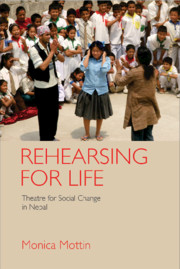Book contents
- Frontmatter
- Dedication
- Contents
- List of Tables, Figures and Boxes
- Acknowledgements
- Chapter 1 Theatre and Life: Theatre at the intersection of art, politics and international development
- Chapter 2 Spacing Out to Speak Up: Resistance, protest and the emergence of street theatre
- Chapter 3 The Streets Become the Stage: Performance, protest and theatre in a time of political crisis
- Chapter 4 Kachahari Natak: Fragments of an aesthetics of theatre for social change
- Chapter 5 Activism not Development Work: Explorations in Tharu kachahari natak
- Chapter 6 A Cultural Army for a Cultural Revolution: Maoist cultural programmes and revolutionary theatre
- Chapter 7 The Ordinariness of the Special: Towards the professionalization of theatre work
- Chapter 8 Conclusions
- Bibliography
- Index
Chapter 4 - Kachahari Natak: Fragments of an aesthetics of theatre for social change
Published online by Cambridge University Press: 05 April 2018
- Frontmatter
- Dedication
- Contents
- List of Tables, Figures and Boxes
- Acknowledgements
- Chapter 1 Theatre and Life: Theatre at the intersection of art, politics and international development
- Chapter 2 Spacing Out to Speak Up: Resistance, protest and the emergence of street theatre
- Chapter 3 The Streets Become the Stage: Performance, protest and theatre in a time of political crisis
- Chapter 4 Kachahari Natak: Fragments of an aesthetics of theatre for social change
- Chapter 5 Activism not Development Work: Explorations in Tharu kachahari natak
- Chapter 6 A Cultural Army for a Cultural Revolution: Maoist cultural programmes and revolutionary theatre
- Chapter 7 The Ordinariness of the Special: Towards the professionalization of theatre work
- Chapter 8 Conclusions
- Bibliography
- Index
Summary
The intersections of power, politics and theatre have been the focus of the previous chapters. Political power creates powerful but ‘real’ illusions to sustain itself. Theatre and the ‘theatrical mode’ may undo the inconsistencies of political power and challenge it by revealing its gaps. But the reverse is also true. Theatre and cultural performances can objectify identity claims and strengthen ideological belongings. As a result, stage representations appear as thick, contested, and simultaneously grounded illusions/allusions, far closer to ‘reality’ than the strategic performances of everyday life and politics. Because of the intentionality of its production, the world of ‘make-believe’ takes up tangible material forms. But it is the declared and assumed theatricality and illusion of the performance that creates a space for the ‘rehearsal’ of unpleasant or unwanted social truths. They can, if necessary, be dismissed as ‘theatre’. Through playfulness and irony theatre destabilizes fixed notions of ‘truth’, and calls up every spectator to identify what is ‘real’ and what is not. While engaging the personal, loktantrik natak challenges power at macro-level; in contrast, kachahari natak focuses on micro-level power dynamics. This chapter focuses on how street theatre, namely kachahari natak, represents and questions social issues within the context of planned development projects. In particular, the practices of doing kachahari natak in Kathmandu will be unpacked. After exploring how Boal's format of forum theatre was adapted into the Nepali form of kachahari natak, the process of its standardization/mechanization as another form of development drama will be detailed. What emerges is that creativity needs to be ‘regulated’ to fit both planned and organizational development, the ‘special’ of theatre is moulded into the ‘ordinary’ of manageable, daily working practices (Chapter 7). But first, I will focus on the moment when the political street theatre described in Chapter 2 entered the world of international development after 1990. In particular, I will draw from actors’ narratives to describe Aarohan's urge to get involved in theatre for development.
- Type
- Chapter
- Information
- Rehearsing for LifeTheatre for Social Change in Nepal, pp. 117 - 157Publisher: Cambridge University PressPrint publication year: 2017



